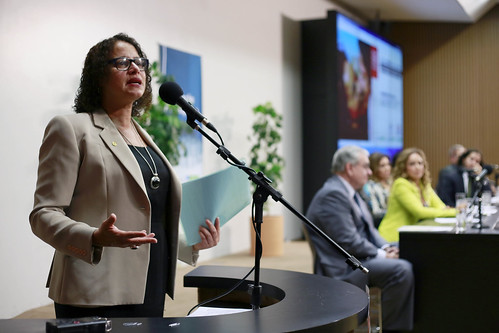Ted Cruz: Queries on Marriage Equality Show Media's 'Obsessed With Sex'
Perhaps Cruz should take a look at his own obsessions.
Trudy Ring
Ted Cruz: Queries on Marriage Equality Show Media's 'Obsessed With Sex'
Perhaps Cruz should take a look at his own obsessions.
Trudy Ring
9 Things You Can't Change About Your Partner (So Don't Even Try)

Love can move people to do things they never thought possible: Who among us ever believed they’d find someone worthy of sharing an order of fries? That’s the power of love, people.
As powerful as being in a relationship can be, there are some things that even love can’t change — namely who your partner is at his or her core. Below, experts weigh in with nine things you can’t change about your S.O., as hard as you may try.
1. Her relationship with her family.
You know that saying, “You don’t just marry a person; you marry his or her entire family”? It’s 100 percent true, said Karl Pillemer, a professor of human development at Cornell University and the author of 30 Lessons for Loving: Advice from the Wisest Americans on Love, Relationships, and Marriage
“People’s feelings about their own families are deeply ingrained, and they are not likely to alter significantly after you tie the knot,” Pillemer said. “You can come to compromise, but if your spouse and your family don’t get along, pressing for change is not likely to work. Instead, I’d tell you to give your S.O. a free pass to avoid unnecessary get-togethers. Family togetherness is nice, but not at the expense of your relationship with your partner.”
2. Whether he’s an extrovert or an introvert. 
Opposites attract, but only up to a point: Somewhere down the line, you may wish your introverted partner was a little less inclined stay in for yet another night of Netflix — and he very well might wish you’d reign in your social butterfly ways.
“Your partner’s temperament is one thing you really can’t change,” said Samantha Rodman, a licensed psychologist and dating coach. “One great example is whether they are an extrovert, who relaxes by being around others, or an introvert, who relaxes by being alone. People who marry across extrovert/introvert divide will have to accept their partner’s needs for social interaction, or, conversely, for time alone to recharge.”
3. Her hobbies.
When work or family life gets stressful, hobbies and pastimes are what keep us going. Don’t bother trying to change your S.O.’s favorite activities, said relationship coach and writer Chris Armstrong.
“For one thing, your annoyance over their shopping or World of Warcraft love is probably much ado about nothing,” he said. “Individuality is important — we lose ourselves and lose control if hobbies are lost, plus the relationship as a whole can be harmed in the process. As I’ve told a client, if you know that a hobby is a big part of your S.O.’s life but it’s too much of a time-suck in your eyes, you two probably aren’t a good fit.”
4. His anger issues.
Many of us go into relationships believing we can change or fix things we don’t like about our partners. If the the trait in question is your S.O.’s anger issues, holding on to that belief can be downright dangerous.
“Explosive and disproportionate anger is one of the most common reasons people offer up for their marriages going south,” Pillemer said. “It’s an issue that needs to be taken with the utmost seriousness: Beware of a person who has a bad temper, who seems to get angry over nothing and, in particular, a person whose anger seems out of proportion to the situation. This is one personality characteristic that is almost impossible to change.”
5. Her religious beliefs.
While it’s certainly not always the case, having an interfaith relationship when you’re both deeply religious may prove problematic, Rodman said. Much of the time, the problems doesn’t arise until much later in the relationship, when a couple decides to have kids.
“People who were raised going to religious services frequently will often want to resume this practice when they have their own children, even if they didn’t attend services as a younger adult,” she said. “On the flip side, if your partner is an atheist and agnostic, it’s unlikely they’ll become devout believers just by virtue of being with someone with faith.”
6. His need for alone time. 
You want to spend every waking moment with him, but he needs his space. You might read the request as hurtful, but consider the silver lining: Time apart often keeps a relationship fresh while ensuring that you both maintain your individuality, said Armstrong.
“When people are always together, they can feel as though the relationship is the only substantive thing going on in their lives,” he explained. “It can cause resentment. People want companionship but they also want meaningful connections and self-reflection to both recharge and keep their relationship fresh. Attempting to change a partner’s desire for alone time is a non-starter.”
7. Her need to plan every last detail.
You meticulously plan every last detail of your life, from when you’re taking your next vacation to when you want to have baby #1. Meanwhile, he’s a take-life-as-it-comes type. The divide may be endearing at first — you complement each other so well! — but eventually, it might become problematic . In any case, you’re not likely to change each other’s way of thinking, said clinical psychologist Jill Weber.
“Usually it is not a case of polar opposites, but rather a difference in degrees,” she said. “Some people are more regulated and are prepared to pay attention to the details of life while others are more likely to go with what they are feeling in the moment. The conflict plays out in a variety of ways — rules for how the children will be raised, spending and saving or even how to spend a weekend. Marriages where people vary strongly in their tolerance for delayed gratification can deteriorate to a condition where all of the energy in the relationship is going to trying to change the other.”
8. His thoughts on having kids. 
If someone you’re seeing tells you in a straightforward way their true feelings on having kids, trust them. Moving forward with a relationship in the hopes that they’ll change their mind once you’re married or otherwise committed is a very risky gamble, said Armstrong.
“It’s perfectly reasonable for someone to say, ‘I can see myself having kids with the right partner’ but this is wholly different than someone going from ‘I don’t want kids’ to ‘I want kids,'” he said. “Some people do not want children because of the financial or time commitment required. Others have no desire because they don’t want to be responsible for another human being. Are they going to change? Not likely. Should you want them to? Absolutely not.”
9. Her sense of humor.
Whether or not you both crack up at Louis CK’s potty jokes may seem too minor to make this list, but having a similar sense of humor is more important than you realize.
“Older people I’ve interviewed have told me that some future marital problems can be diagnosed based on the question: ‘Do we think the same things are funny?'” Pillemer said. “Sense of humor is a strong indicator of compatibility. If you laugh at the same things, you are likely to see the world in similar ways. But there’s an even more important reason to take a careful look at your partner’s sense of humor: You will be stuck with it for many, many years. If his idea of high humor involves practical jokes and yours doesn’t, rest assured that you will not find the hand buzzer or the whoopee cushion more hilarious fifty years from now.”
Keep in touch! Check out HuffPost Divorce on Facebook and Twitter. Sign up for our newsletter here.
— This feed and its contents are the property of The Huffington Post, and use is subject to our terms. It may be used for personal consumption, but may not be distributed on a website.

Debunked: Talking to Gays Might Not Change Voters' Minds
A new report discredits a much-hailed study that speaking with gay people can sway opinions on same-sex marriage.
Daniel Reynolds

Suspect Charged in London Murder of Trans Woman Visiting from U.S.
More than a month after Vanessa Santillan was found beaten to death in a London apartment, police have apprehended her suspected killer, Joaquin Gomez-Hernandez.
Mitch Kellaway
www.advocate.com/crime/2015/05/20/suspect-charged-london-murder-trans-woman-visiting-us
Groundbreaking Study On Gay Marriage Views May Have Been Faked
A seemingly groundbreaking and widely publicized study reported in Science magazine this past December may be a fake.
The study appeared to show that openly gay activists in California had persuaded conservative voters to change their minds in a lasting way by engaging the voters in “heartfelt, reciprocal and vulnerable conversations” about being gay during door-to-door advocacy campaigns. It was co-authored by Michael J. LaCour, a Ph.D. candidate in political science at the University of California, Los Angeles, and Donald P. Green, a professor at Columbia University.
For the gay rights movement, this was good news. It suggested that the country’s shift on gay rights was, at least in part, the movement’s doing, and it provided a template for advocacy going forward. Gay rights advocates in Ireland reportedly based their strategy before a national vote on same-sex marriage this week on LaCour and Green’s results.
But according to a report issued Tuesday by two University of California, Berkeley, graduate students and a Yale professor, there are enough questions about the data to warrant retracting the study. Retraction Watch broke the story Wednesday about what students David Broockman (soon to be an assistant professor at Stanford) and Joshua Kalla and Yale professor Peter Aronow found.
The LaCour-Green study had examined the work of activists with the Los Angeles LGBT Center. After California’s gay marriage ban passed in 2008, activists at the center had more than 12,000 one-on-one conversations in Los Angeles neighborhoods with people who overwhelmingly supported the ban. LaCour’s idea was to see if those conversations produced any lasting change. He purportedly designed a randomized experiment to replicate those conversations, with a series of follow-up surveys online to test how the anti-gay voters felt about gay rights and gay marriage over time. Those who were contacted by the openly gay canvassers showed substantially more positive attitudes toward gay marriage as much as nine months later.
At least, that’s what the published study said in December. But now it appears those critical follow-up surveys may not have been conducted as described.
After the LaCour-Green study was published, Broockman and Kalla were impressed by its findings and wanted to extend the research. In January 2015, they found some patterns in the data that seemed to be too perfect — statistically speaking, there was less variance in the results than there should have been. Some social scientists had noticed this when the study was first published.
As Broockman and Kalla continued their work, they wrote in their report, they uncovered more irregularities. When the pair noticed that their own study had a much lower response rate (the proportion of people contacted who actually respond to a survey), they asked the survey firm that allegedly gathered data for LaCour, Qualtrics, how it achieved such a high response rate. They said the firm replied that it had no record of the project.
This is what happened next according to their report and Green’s letter to Science: The statistical irregularities continued to mount, and the pair recruited Aronow to help with their analysis. Last weekend, Broockman and Kalla contacted Green. Green said that he had joined the study after the data had been collected and thought that the irregularities Broockman and Kalla had uncovered were, indeed, highly suspicious. Green reached out to LaCour’s adviser at UCLA, professor Lynn Vavreck, and the two of them decided that Vavreck would confront LaCour and ask him to provide his data. Initially, LaCour claimed he had accidentally deleted the file with the necessary information, but again Qualtrics said it could not verify that the data had been deleted or that the study took place. It seemed increasingly clear to Green that no follow-up surveys had ever been conducted and that LaCour may have taken data from existing studies and manipulated the numbers to achieve the results he wanted.
Green told The Huffington Post that he was shocked and dismayed by the revelations about the data set. “There was a mountain of fabrication,” he said. “Graphs and charts and anecdotes and stories of every possible sort about these surveys. So it didn’t occur to me that the whole thing was fabricated because every time I had a question, it seemed as though [LaCour] had an answer.”
Green has since issued a retraction of the study.
LaCour, for his part, declined a request for an interview from The Huffington Post. “I’m gathering evidence and relevant information so I can provide a single comprehensive response. I will do so at my earliest opportunity,” he wrote in an email.
How did this happen? Science is a highly regarded, peer-reviewed publication, meaning that other experts review research before it is published to evaluate its quality and contribution to the field.
The Huffington Post confirmed with Science editors that the article in question did go through the magazine’s in-depth review process. This requires at least two people unconnected to the research to read the paper and return comments within a week or two.
“In general, reviewers for Science look at the data presented in submitted manuscripts,” said Monica Bradford, Science executive editor. “Some reviewers might redo analyses to see if they obtain the same results as described by authors. In some rarer cases, referees may also ask for the raw underlying data, which Science obtains and provides for them.”
Bradford said, however, that reviewers aren’t likely to go to the lengths Broockman and Kalla did: “Even if the reviewers had asked for the raw survey data underlying these results, it is unlikely they would have contacted the survey company to confirm it had carried out the surveys and supplied LaCour with the data.”
So while peer review aims to prevent bad research from being published, it is not a perfect safeguard against all possible fraud. Reviewers, editors and even co-authors tend to trust that researchers wouldn’t fake data. However, Science’s requirements for data to be made available ultimately helped uncover the alleged fraud — others were able to access the data and identify major issues.
In a statement Wednesday, Marcia McNutt, editor-in-chief of Science Journals, said, “At this time, our Editorial staff is assessing the report. Given the fact that the [co-author] Dr. Green has requested retraction, Science will move swiftly and take any necessary action at the earliest opportunity. In the meantime, Science is publishing an Editorial Expression of Concern to alert our readers to the fact that serious questions have been raised about the validity of findings in this study.”
A spokesman for the Los Angeles LGBT Center said the center was dismayed by the news that the study results may have been fabricated. “We sought external and independent evaluation of our voter canvassing project to determine the efficacy of the work through unbiased analysis,” said David Fleischer. “We are not in a position to fully interpret or assess the apparent irregularities in the research as we do not have access to the full body of information and, by design, have maintained an arms-length relationship with the evaluation of the project.”
Last December, Green told The Huffington Post that the results of the study were a revelation for him. “I’m more excited about these results than I have been about anything in a long time,” he said. “I used to think that attitudes were stable.”
Green said Wednesday that he is more determined than ever to find out whether the types of conversations conducted by the Los Angeles advocates could indeed produce lasting change in anti-gay voters.
“An actual experiment was conducted, a very nicely designed and elegant experiment, and the irony is that we don’t know what effects the experiment had because the outcomes were never measured,” Green said. “I am determined to do this study again, this time for real.”
— This feed and its contents are the property of The Huffington Post, and use is subject to our terms. It may be used for personal consumption, but may not be distributed on a website.
Congress Ignores Needs of Homeless Youth in Trafficking Bill

Yesterday, the U.S. House of Representatives passed the Justice for Victims of Trafficking Act, sending it to the President’s desk for signature. Unfortunately, a key measure to prevent trafficking by reauthorizing homeless youth programs was not included.
HRC.org

GLAAD Kicks Off Southern Stories Summer Tour With Concert for Love and Acceptance
GLAAD finds the perfect way to spread the message of LGBT equality and acceptance in the South — country music.
Raffy Ermac